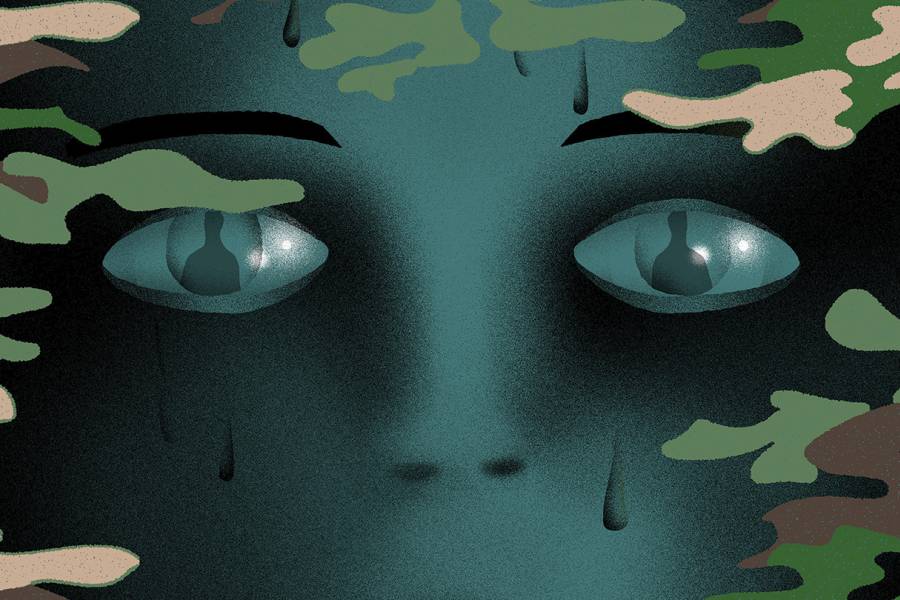In 2018, Donald, a 20-year active duty service member, and his wife lost their teenage daughter to suicide, an intentional drug overdose. When Donald—whose name has been changed—confided in his servicemen colleagues with teenage children, he heard echoes of his pain. Every person he sought counsel from shared a story of a child who had been in counseling, attempted suicide, or had a behavioral health issue such as anxiety or addiction. They first tried to address the problems discreetly through self-help books and online searches. When they did seek professional help, the parents found few on-base mental health resources to support them beyond short counseling sessions and a web directory of service providers. Referrals for off-base treatment often put them on six-month to yearlong waiting lists.

Image credit: Courtesy of Catherine Ling
The barriers to obtain specialized health services and the gaps in care for both military children and spouses can have a devastating effect, according to Catherine Ling, an associate professor at the School of Nursing who has studied the health needs of active military personnel and veterans for two decades.
"Quite frankly, spouses and children are not part of the military's mission, as the resources they need don't promote warfare readiness," she says.
More than 50% of active duty service members are married, for a total of 700,000 spouses, most under age 40. There are currently 1.2 million children of active duty members worldwide. This population faces an array of challenges and stressors owing to frequent deployments and the dangers associated with service life. On average, a military family moves every two to three years, and kids can expect to attend six to nine different schools before age 18. With that constant change of address, some parts of health care fall through the cracks, Ling says. Kids don't get routine checkups, immunization and medical records may be incomplete or scattered, and there is no continuity of care. The prolonged family separation, economic disadvantages, potential injury or death of a service member, and disruption of education can have a cumulative negative effect on the entire family. Pile all this atop normal teen trials like dating and social media status.
As a result, one-third of school-age military children show psychosocial behaviors such as being anxious, worrying often, crying frequently, and other signs of toxic stress, according to a 2019 review of literature published in Pediatrics. Anxiety and depression are common, and academic performance can suffer. The kids also feel the parents' hurt. Dad could be suffering from PTSD or other anxiety disorders. And according to a recent report from the Substance Abuse and Mental Health Services Administration, an estimated 29% of military wives had mental illness and 12% had experienced at least one major depres?sive episode.
Ling, a military spouse herself, knows this transient and sometimes stressful life well. She's the daughter of a Vietnam War vet, and she lived in 11 cities during her husband's 29-year Navy career. "My kids say they are from nowhere," she says. "That really tore me up the first couple of times they said that."
Ling proposes a "military-civilian bridge" between deployments, so when a family shows up at a new city or base there is a liaison to onboard them with available health care in the area and find them services. She also suggests implementing health literacy training to help families better advocate for themselves and learn how to navigate the off-base health care system. In the April edition of the Archives of Physical Medicine and Rehabilitation, Ling co-authored a report that called on civilian health care providers to better identify military-connected children and spouses. Just knowing the connection will prompt the provider to ask questions spelled out in the I Serve 2 pocket card developed by the American Academy of Nursing, which screens for physical, psychological, and behavioral risk factors associated with service life. They might ask a child: "How have things been since your parent returned from deployment?" The provider can then look for warning signs of mental illness.
Also see
An extra benefit to all this could be increased retention rates. "The Armed Forces branches realize that when momma is not happy, nobody is happy, and people leave the military," says Ling, who is currently conducting an integrated review of military spouse mental and physical health. "The primary driver behind who stays or goes is the spouse."
The good news, Ling says, is that the majority of military spouses and children learn to be flexible and acclimate to new environments. "They often demonstrate great strength and adaptability in response to difficult situations," she says. "Kids can weather a number of moves if they have a consistent caretaker, whether a stay-at-home parent or a family member who can be home. But this continuity of care piece is important. I want to help give them that."
Posted in Health
Tagged pediatrics, mental health, nursing, ptsd, military, anxiety, army












